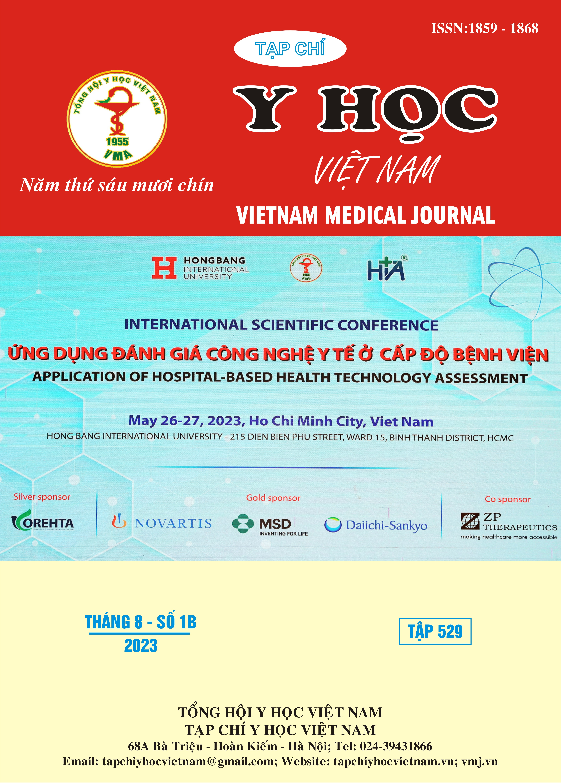FEATURES OF SLEEP QUALITY IN ELDERLY PATIENTS WITH HYPERTENSION TREATED AT NATIONAL GERIATRIC HOSPITAL
Main Article Content
Abstract
Background: Sleep disorders and hypertension are common conditions in the elderly. These two health conditions are closely related and influence each other. In particular, poor sleep quality in older people with hypertension, if not detected early and treated, can lead to ineffective blood pressure control, increase the risk of other diseases, and lead to increased morbidity and mortality, reduced overall quality of life. Objectives: To describe the quality of sleep in elderly patients with hypertension treated at the National Geriatric Hospital. Subjects: 95 elderly patients with hypertension treated inpatient and outpatient at National Geriatric Hospital in the period from January 2023 to April 2023 who were surveyed about sleep quality. Methods: Cross-sectional study, using PSQI sleep quality questionnaire. Results: Most of the patients surveyed had sleep disorders, accounting for 80%. Of which 68.4% of patients had chronic sleep disorders for 1 year or more. On average, patients went to sleep from 21±1.3 hours. After about 58.7 minutes, the patient could start to fall asleep. Patients usually woke up at 4.2 am. Most of the patients self-reported their sleep status was relatively poor and very poor (73.7%). Conclusion: The proportion of patients with sleep disorder is high. Patients often get poor sleep quality for rather a long time and often have difficulty falling asleep.
Article Details
Keywords
quality of sleep, sleep disturbance, hypertension, elderly people, PSQI
References
2. WHO, Ministry of Health. WHO-AIMS Report on Mental Health System in Vietnam. In: ; 2006.
3. Paudel P, Chalise S, Neupane DR, Adhikari N, Paudel S, Dangi NB. Prevalence of Hypertension in a Community. JNMA J Nepal Med Assoc. 2020;58(232):1011-1017. doi:10.31729/jnma.5316
4. Chen S, Song X, Shi H, et al. Association Between Sleep Quality and Hypertension in Chinese Adults: A Cross-Sectional Analysis in the Tianning Cohort. Nat Sci Sleep. 2022;14:2097-2105. doi:10.2147/NSS.S388535
5. Gangwisch JE. A Review of Evidence for the Link Between Sleep Duration and Hypertension. Am J Hypertens. 2014;27(10). Accessed March 8, 2023. https://cyberleninka.org/article/n/378762
6. Mannion H, Molloy DW, O’Caoimh R. Sleep Disturbance in Older Patients in the Emergency Department: Prevalence, Predictors and Associated Outcomes. Int J Environ Res Public Health. 2019;16(19):3577. doi:10.3390/ijerph16193577
7. Tuấn NV, Thắng N, Tùng VS, et al. Đặc điểm lâm sàng chất lượng giấc ngủ ở bệnh nhân cao tuổi tăng huyết áp. Tạp Chí Nghiên Cứu Học. 2021; 145(9):45-54. doi:10.52852/tcncyh.v145i9.257
8. Li L, Li L, Chai JX, et al. Prevalence of Poor Sleep Quality in Patients With Hypertension in China: A Meta-analysis of Comparative Studies and Epidemiological Surveys. Front Psychiatry. 2020; 11:591. doi:10.3389/fpsyt.2020.00591
9. Cho MC. Clinical Significance and Therapeutic Implication of Nocturnal Hypertension: Relationship between Nighttime Blood Pressure and Quality of Sleep. Korean Circ J. 2019; 49(9):818-828. doi:10.4070/kcj.2019.0245
10. Son J, Jung S, Song H, Kim J, Bang S, Bahn S. A Survey of Koreans on Sleep Habits and Sleeping Symptoms Relating to Pillow Comfort and Support. Int J Environ Res Public Health. 2020;17:302. doi:10.3390/ijerph17010302


